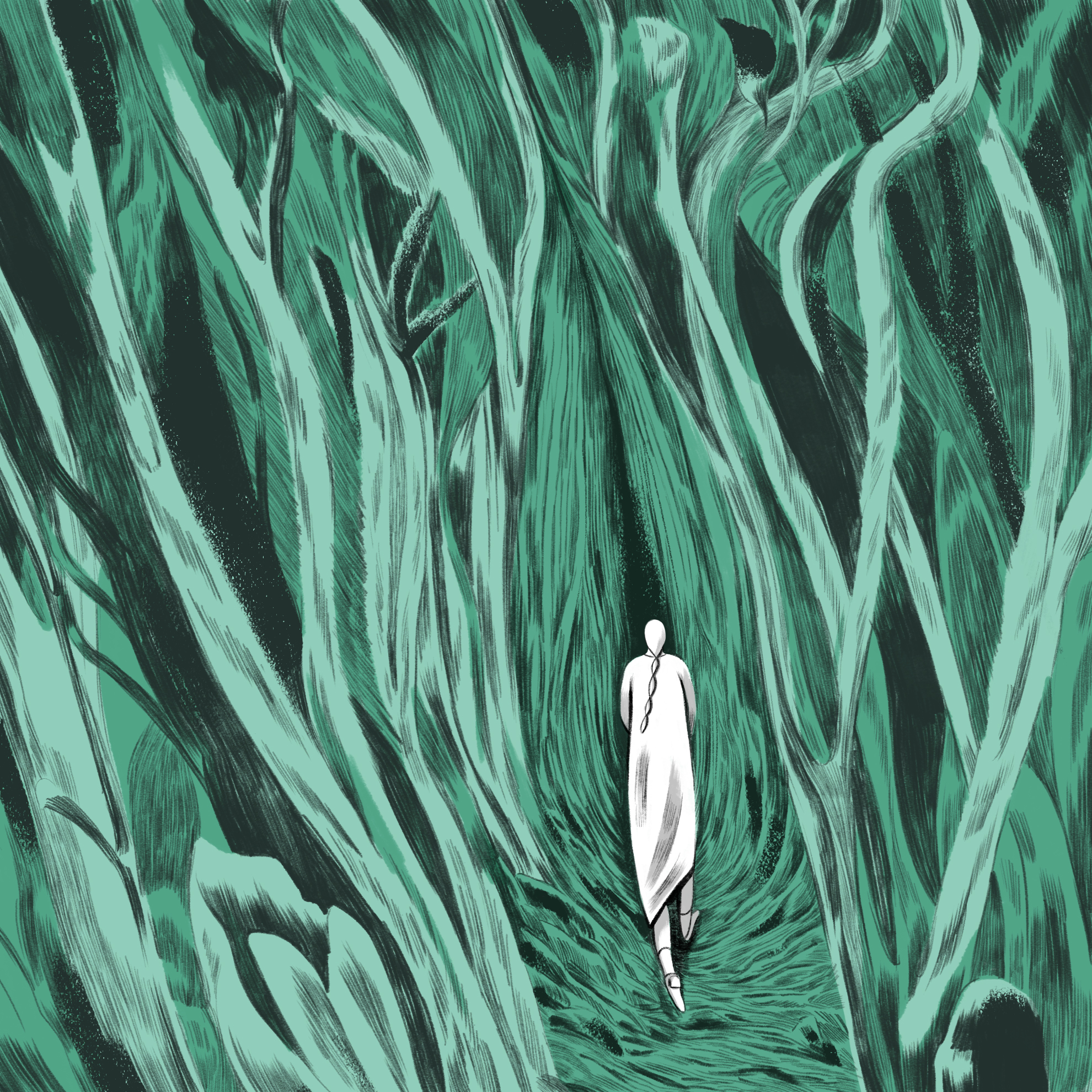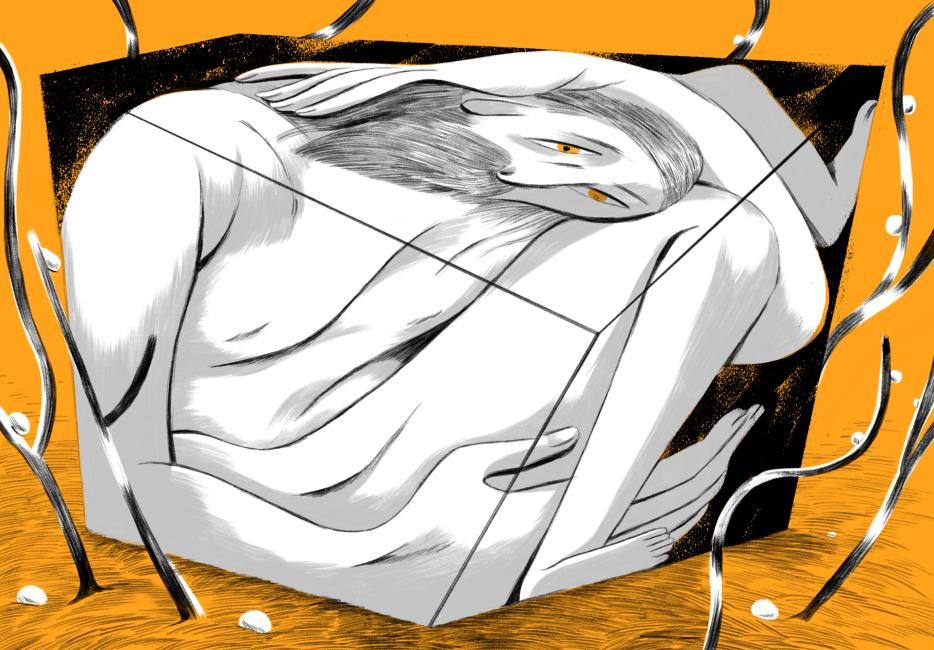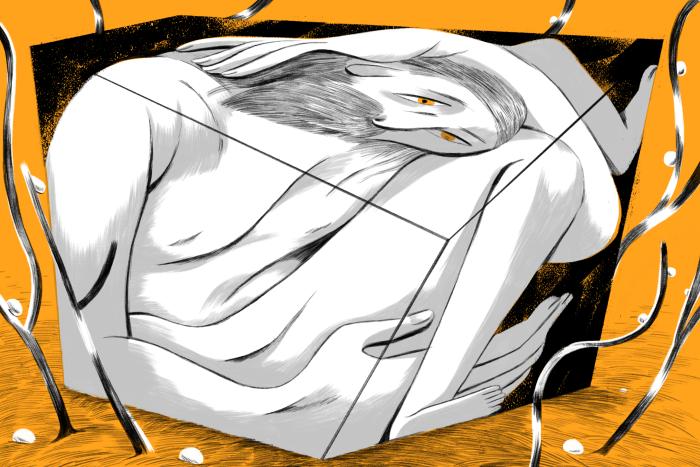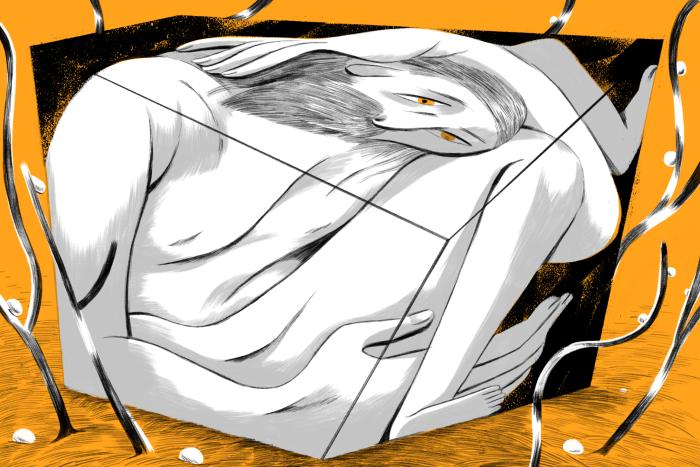Where is part one? Here is part one.
They travelled as if drawn by magnets, waking at dawn and following the river that Gretchen said would take them to the place they needed to be. She was a fine hunter and they didn’t want for food. “I was the best cook at the orphanage,” she told Michael, feeding the fire with sticks and moss he had gathered. “I made very tall pastries, filled with custard and dusted with sugar. We never got to eat them, of course. They were for the wealthy men who came each day to take what we had made. Sissy was dull and couldn’t do much more than sift flour, but I kept her in the kitchen with me. I expect her punishments have been plenty since I left.”
Each of them held a bird on a spit, turning its inert body over the fire until Gretchen said they could eat. Michael loved hearing about the pastries, frosted in colours he had seen reflected in clouds during certain sunsets. Eggs cracked one-handed into bowls, flour scooped from yawning sacks, sticks of yellow butter in a softening pyramid—Gretchen described each ingredient so well Michael felt they were there before him on a long wooden table, flickering under morning light. In his shack, Michael’s diet had been vegetarian, not by choice, but by circumstance. Every few days, Burt threw a few hunks of mouldy bread and cheese through the roof. Hunger was so constant that Michael came to like the food he was cast, finding flavours that may or may not have been there within its blandness and rot. Sitting beside the fire with Gretchen as she told him of sugar clouds and velvet coin bags, he took his first bite of meat since he was a boy. Its bloodiness spread through his body, filling him with heat and colour. There had been barbecues whence he came, with hot dogs and relish and one cold pop for each of them. “Are you even listening to me?” Gretchen asked, throwing the remains of her meal into the fire. “It sounds beautiful,” he replied. “Of course it was,” said Gretchen. “But harsh,” she added. “Very harsh.”

They walked and hunted and ate and slept. Sometimes the hours passed in complete silence, other times Gretchen recounted bitter details of orphanage life, to which Michael responded with apt sounds of validation and dismay. On better days, she described the fairness and wealth of her dead parents, of the home they had lived in before the orphanage, the home where she was heading now. When she grew weary of explanation or was made unhappy by recollection, she sang a melody of her childhood. Michael’s ear was quick to tunes and gradually the song became a meandering conversation between the two, turning things they passed on their journey into lyrics for their river song. Michael’s calves widened and his chest expanded with the fresh air he breathed. The sunlight they followed through the day penetrated his skull, it seemed, and he smiled as he walked a few paces behind Gretchen. In the middle of the night, he would briefly yearn for his mother and father to hold him as they had when he was young. But then, he was no longer young, and Gretchen held him in her way.
“Let me see what’s in your pants,” she said one evening, as Michael buried some animal bones near the river’s edge. “My pants?” he said, standing up so fast his head plunged into a thatch of low-hanging branches. Gretchen laughed and sprawled herself on the ground, the blanket of needles shifting beneath her. “It’s a nice thing,” she said. “Come down here and I’ll show you what I mean.” She showed him several times what she meant, and Michael quickly understood.
The evenings were colder now, and the fire had burned down to embers. Michael had grown less fond of night now that the openness was no longer new. It reminded him too much of something he couldn’t name: his worst and oldest feeling, which lived as much in his body as in his mind. The lightening sky came as a relief. Gretchen turned over and pulled him close to her as the birds began to chirrup, invisible in the trees but for the occasional darting shadow. “There is only one thing I need,” said Gretchen, as they lay entwined. Michael warmed, anticipating the invitation to join her at Homestead, in the big feather bed that had belonged to her parents, Mitch and Barb. His attentive silence, his loyalty, his body would be rewarded with Gretchen’s companionship. “I need my Sissy,” she continued, placing a finger on Michael’s left nipple. “I need her and she needs me. We are each one part of a pair.” She took Michael’s right nipple in her other hand and pinched hard between her fingernails.
Michael was unsure what this meant. Not the nipples; he knew what that meant. As he watched Gretchen moving atop him, eyes shut tight, it seemed clear that he would have to make himself indispensable if he wanted to reach Homestead with her and Sissy. But what about him could not be dispensed of?
On a vaporously cool, white-skied day, Michael and Gretchen reached the township Sissy had been moved to. “We were being transferred, both of us. 18-hour days in the Damp Factory.” She shuddered. Why, Michael wondered, had Gretchen left her sister to such a miserable fate while she herself pursued a free life? He did not ask, because more than ever he needed to prove to Gretchen his respect for her rules. Instead, he thought of that single, plangent cough from the night of his own escape, how he had fled from its proposition. Gretchen’s voice broke his reverie. “I’m coming for you, Sissy,” she said, pushing the gate inward.
He knew that forgetting was much like healing, for he had done a lot of that himself.
They hid in a cellar beneath the town pub. Huddled on its dusty floor, Michael was struck by its similarity to his shack. He thought of Beatrice, and the square-cut hole in his tin roof, from which he’d watched the sky as if it might bring news. He hadn’t been happy there, but at least it had been entirely known. Long ago, he’d reached consensus that this is what life was like and as the years passed his imagination ceased to provide alternatives. Now, he was frightened, and the thought of being without Gretchen made him more scared than he could physically suppress. He reached out and touched her left cheek, which relaxed upon contact.
It hadn’t taken Michael long to realize why Gretchen’s mouth was off-centre: almost constantly, except while sleeping or having sex, Gretchen would bite the inside of her left cheek, fretting the soft flesh from front to back. Occasionally she bit too deep, spitting blood and greyish pink threads of flesh. These were the only moments that Michael saw any flicker of anguish in Gretchen’s manner. He understood that for her, this habit was both comfort and its opposite. He never questioned her, as promised. But on this night, confined to the cellar below rowdy men, singing and thumping and no doubt spilling ale on the packed-dirt floor, he felt permitted to acknowledge it with a touch. “I wonder,” he said, “whether my own sisters remember me. They were so young when I was taken, it’s possible my parents thought it best to let them forget.” He knew that forgetting was much like healing, for he had done a lot of that himself. Gretchen turned her face away from his touch. “Sissy certainly remembers me as much as I remember her. Perhaps more.” Michael held his hand, heavy as a stone in his other fist.
The sunlight woke them the next morning, a solitary beam that sought out Michael’s head particularly. They climbed the stairs to find the grassy medians of the main boulevard sparkling with frost. Gretchen faced Michael, a thing she did rarely or perhaps never. “This is it,” she said, her eyes mirrors that showed him his own hairy face. Michael raised a hand to block the sun, but her eyes kept him out.
“I won’t be able to get Sissy out with you lagging behind. You’re dead weight,” she said. “But you said if I didn’t ask questions—” “Michael,” she sighed, as if they’d been talking for a very long time. “You’re a criminal. A fugitive of the law. How am I supposed to introduce you to my family?” Michael’s head swam, his mouth shaping sounds that failed to materialize. “You’re not free, and you never will be, so you’re a liability.” “I’m not a criminal,” he mumbled. “I didn’t commit any crime, I was just taken, from my family, a child like your Sissy,” he stuttered. “That’s what you say,” said Gretchen, picking a bit of invisible lint from her lapel. “But how likely is that, really. You were a prisoner, and that’s what you are. You’ll never stop being one.” Michael couldn’t argue with this. Was she right? Had he done something criminal and not known it? Had his escape been ill earned? “You were a friend to travel with but now I’ve arrived at my destination.” He looked at her, braids tight as ever, small mouth subtly askew. He had done as she said—hunted, walked, listened, and slept. In spite of that, he had lost her. “I knew you’d get it eventually,” Gretchen said, smiling as she turned away. “It’s been real,” she added, before stepping into the street, running lightly across, cresting a gleaming hill, and fading from view completely.
Where is part three? Here is part three.






